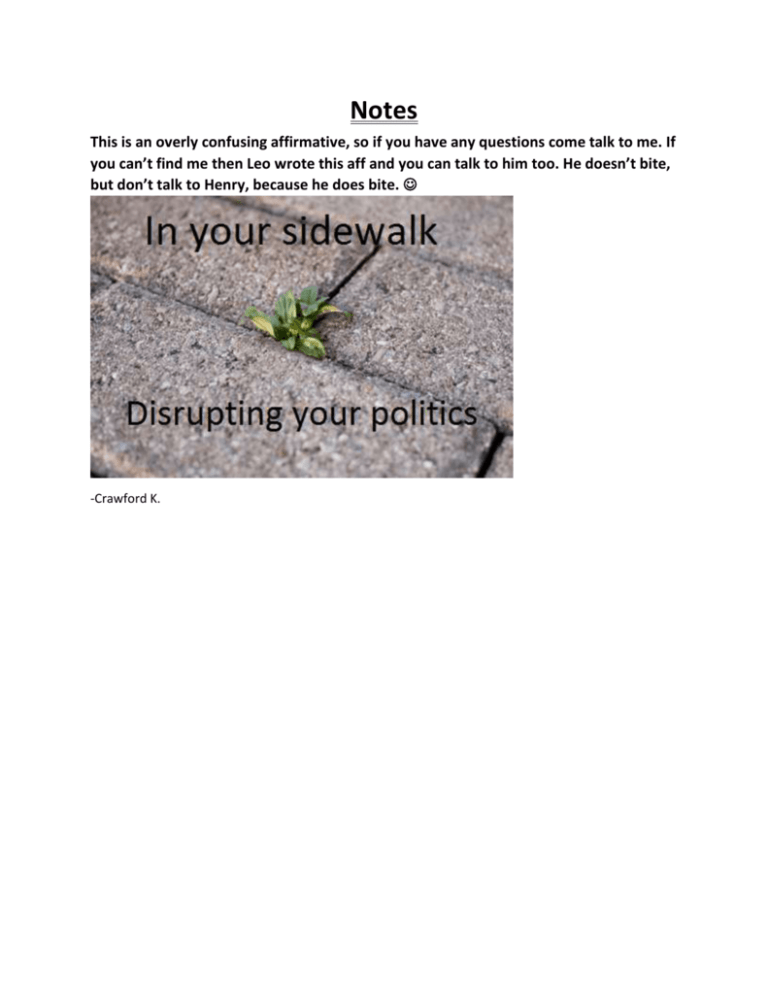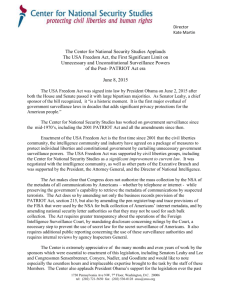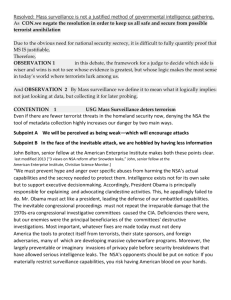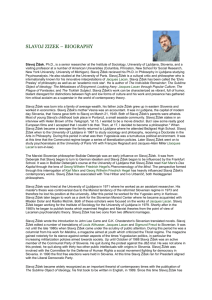Ironically, the surveillance assemblage has opened a new
advertisement

Notes This is an overly confusing affirmative, so if you have any questions come talk to me. If you can’t find me then Leo wrote this aff and you can talk to him too. He doesn’t bite, but don’t talk to Henry, because he does bite. -Crawford K. 1NC Neoliberalism K The Deleuzian thesis of the 1AC has been coopted by neoliberalism Vandenberghe 8—Frédéric Vandenberghe, a research professor in sociology at the Institute of Social and Political Studies, 2008 (“Deleuzian Capitalism,” Available online at http://www.academia.edu/859731/Deleuzian_capitalism, Accessed on 7/22/15) A quarter of a century later, the process of accumulation has accelerated to the point that capitalism itself has become Deleuzian in form, in style and in content. This junction is not accidental. As usual, an ironic and profoundly perverse relationship exists between the romantic ethic and the spirit of capitalism (Campbell, 1987: 202–27). Needless to say that I am not claiming that Deleuze’s libertarian critique of capitalism was anti-critical or phoney from the start and that Deleuze is somehow the Giddens of the 1970s: a neo-liberal disguised as a libertarian, or Thatcheron LSD. What I am claiming is, rather, that capitalism has progressively integrated the critique of capitalism into its mode of functioning, with the result that capitalism appears stronger than ever, whereas the critique of capitalism seems rather disarmed In their magisterial analysis of the new spirit of capitalism, Boltanski and Chiapello (1999: 241–90) have convincingly demonstrated that capitalism has coopted the postmodernizing critique of the 1960s and 1970s and used it as a way to reorganize itself and expand infinitely. The industrially organized capitalism of the ‘golden thirties’ (1945–73) was essentially Fordist. Bureaucratic, hierarchical, pyramidal and centrally controlled, planned and taylorized, oriented to the mass production of standardized goods, it was elephantine, rigid and alienating. The neo-corporatist arrangement between the state, the employers and the unions guaranteed job security, an indexed income, a steady career track and apension, but this security hardly compensated for the employees’ lack of autonomy. Attacking the dehumanizing and disciplining, massifying and standardizing nature of the ‘capitalist-bureaucratictechnical-totalitarian society of planned exploitation and directed consumption’ (Lefebvre) in the name of spontaneity, creativity and authenticity, the libertarian left took over the ‘artistic critique’ of capitalism of the bohemians and trans-lated their grievances in a language that was inspired by surrealism and the ‘masters of suspicion’ (Marx, Freud and Nietzsche). At first, the capitalists reacted to the ‘artistic critique’ of the soixante-huitards in a traditional way. They negotiated with the unions about ‘quantitative demands’ and granted a pay-rise but, realizing that the critique did not abate in spite of the concessions, they opened discus-sions with the unions about the ‘qualitative demands’. To solve the moti-vational crisis among the ranks of the disenchanted workers, they started introducing changes in the workplace that granted more autonomy to the workers. As the increase of freedom was being paid by a decrease insecurity, the result was most ambivalent. ‘Through this change of politics, autonomy was somehow exchanged against security’ (Boltanski and Chiapello, 1999: 274). The impact is extinction – neoliberal social organization ensures extinction from resource wars, climate change, and structural violence – only accelerating beyond neoliberalism can resolve its impacts Williams & Srnicek 13 (Alex, PhD student at the University of East London, presently at work on a thesis entitled 'Hegemony and Complexity', Nick, PhD candidate in International Relations at the London School of Economics, Co- authors of the forthcoming Folk Politics, 14 May 2013, http://criticallegalthinking.com/2013/05/14/accelerate-manifesto-for-an-accelerationist-politics/) At the begin-ning of the second dec-ade of the Twenty-First Cen-tury, global civilization faces a new breed of cataclysm. These com-ing apo-ca-lypses ridicule the norms and organ-isa-tional struc-tures of the polit-ics which were forged in the birth of the nation-state, the rise of cap-it-al-ism, and a Twen-ti-eth Cen-tury of unpre-ced-en-ted wars. 2. Most significant is the break-down of the planetary climatic system. In time, this threatens the continued existence of the present global human population. Though this is the most crit-ical of the threats which face human-ity, a series of lesser but potentially equally destabilising problems exist along-side and inter-sect with it. Terminal resource depletion, especially in water and energy reserves, offers the prospect of mass starvation, collapsing economic paradigms, and new hot and cold wars. Continued financial crisis has led governments to embrace the para-lyz-ing death spiral policies of austerity, privatisation of social welfare services, mass unemployment, and stagnating wages. Increasing automation in production processes includ­ing ‘intel­lec­tual labour’ is evidence of the secular crisis of capitalism, soon to render it incapable of maintaining current standards of living for even the former middle classes of the global north. 3. In con-trast to these ever-accelerating cata-strophes, today’s politics is beset by an inability to generate the new ideas and modes of organisation necessary to transform our societies to confront and resolve the coming annihilations. While crisis gath-ers force and speed, polit-ics with-ers and retreats. In this para-lysis of the polit-ical ima-gin-ary, the future has been cancelled. 4. Since 1979, the hegemonic global political ideology has been neoliberalism, found in some vari-ant through-out the lead-ing eco-nomic powers. In spite of the deep struc-tural chal-lenges the new global prob-lems present to it, most imme-di-ately the credit, fin-an-cial, and fiscal crises since 2007 – 8, neoliberal programmes have only evolved in the sense of deep-en-ing. This continuation of the neo-lib-eral pro-ject, or neo-lib-er-al-ism 2.0, has begun to apply another round of structural adjustments, most sig-ni-fic-antly in the form of encour-aging new and aggress-ive incur-sions by the private sec-tor into what remains of social demo-cratic insti-tu-tions and ser-vices. This is in spite of the immediately negative eco-nomic and social effects of such policies, and the longer term fun-da-mental bar-ri-ers posed by the new global crises. The alternative articulates a “counter-conduct” – voting neg pushes towards a cooperative conduct that organizes individuals around a collectively shared commons – affirming this conduct creates a new heuristic that de-couples government from the demand for competition and production Dardot & Laval 13 (Pierre Dardot, philosopher and specialist in Hegel and Marx, Christian Laval, professor of sociology at the Universite Paris Ouest Nanterre La Defense, The New Way of the World: On Neoliberal Society, pgs. 318321) This indicates to what extent we must take on board in our own way the main lesson of neo-liberalism: the subject is always to be constructed. The whole question is then how to articulate subjectivation with resistance to power. Now, precisely this issue is at the heart of all of Foucault’s thought. However, as Jeffrey T. Nealon has recently shown, part of the North American secondary literature has, on the contrary, stressed the alleged break between Foucault’s research on power and that of his last period on the history of subjectivity.55 According to the ‘Foucault consensus’, as Nealon aptly dubs it, the successive impasses of the initial neo-structuralism, and then of the totalizing analysis of panoptical power, led the ‘last Foucault’ to set aside the issue of power and concern himself exclusively with the aesthetic invention of a style of existence bereft of any political dimension. Furthermore, if we follow this de-politicizing reading of Foucault, the aestheticization of ethics anticipated the neo-liberal mutation precisely by making self-invention a new norm. In reality, far from being oblivious of one another, the issues of power and the subject were always closely articulated, even in the last work on modes of subjectivation. If one concept played a decisive role in this respect, it was ‘counter-conduct’, as developed in the ‘forms of resistance of conduct’ that are the correlate of the pastoral mode of power. If such forms of resistance are said to be ‘of conduct’, it is because they are forms of resistance to power as conduct and, as such, are themselves forms of conduct opposed to this ‘power-conduct’. The term ‘conduct’ in fact admits of two meanings: an activity that consists in conducting others, or ‘conduction’; and the way one conducts oneself under the influence of this activity of conduction.57 The idea of ‘counter-conduct’ therefore has the advantage of directly signifying a ‘struggle against the procedures implemented for conducting others’, unlike the term ‘misconduct’, which only refers to the passive sense of the word.58 Through ‘counter-conduct’, people seek both to escape conduction by others and to define a way of conducting themselves towards others.¶ What relevance might this observation have for a reflection on resistance to neo-liberal governmentality? It will be said that the concept is introduced in the context of an analysis of the pastorate, not government. Governmentality, at least in its specifically neo-liberal form, precisely makes conducting others through their conduct towards themselves its real goal. The peculiarity of this conduct towards oneself, conducting oneself as a personal enterprise, is that it immediately and directly induces a certain conduct towards others: competition with others, regarded as so many personal enterprises. Consequently, counter-conduct as a form of resistance to this governmentality must lecture of 1 March 1978.56 This lecture was largely focused on the crisis of the pastorate. It involved identifying the specificity of the ‘revolts’ or correspond to a conduct that is indivisibly a conduct towards oneself and a conduct towards others. One cannot struggle against such an indirect mode of conduction by appealing for rebellion against an authority that supposedly operates through compulsion external to individuals. If ‘politics is nothing more and nothing less than that which is born with resistance to governmentality, the first revolt, the first confrontation’,59 it means that ethics and politics are absolutely inseparable.¶ To the subjectivation-subjection represented by ultra-subjectivation, we must oppose a To neo-liberal governmentality as a specific way of conducting the conduct of others, we must therefore oppose a no less specific double refusal: a refusal to conduct oneself towards oneself as a personal enterprise and a refusal to conduct oneself towards others in accordance with the norm of competition. As such, the double refusal is not ‘passive disobedience’.60 For, if it is true that the personal enterprise’s relationship to the self immediately and directly determines a certain kind of relationship to others – generalized competition – conversely, the refusal to function as a personal enterprise, which is self-distance and a refusal to line up in the race for performance, can only practically occur on condition of establishing cooperative relations with others, sharing and pooling. In fact, where would be the sense in a self-distance severed from any cooperative practice? At worst, a cynicism tinged with contempt for those subjectivation by forms of counter-conduct. who are dupes. At best, simulation or double dealing, possibly dictated by a wholly justified concern for self-preservation, but ultimately exhausting for the subject. Certainly not a counter- such a game could lead the subject, for want of anything better, to take refuge in a compensatory identity, which at least has the advantage of some stability by contrast with the imperative of indefinite self-transcendence. Far from threatening the neo-liberal order, fixation with identity, whatever its nature, looks like a fall-back position for subjects weary of themselves, for all those who have abandoned the race or been excluded from it from the outset. Worse, it recreates the logic of competition at the level of relations between ‘little communities’. Far from being valuable in itself, independently of any articulation with politics, individual subjectivation is bound up at its very core with collective subjectivation. In this sense, sheer aestheticization of ethics is a pure and simple abandonment of a genuinely ethical attitude. The invention of new forms of existence can only be a collective act, attributable to the multiplication and intensification of cooperative counter-conduct. A collective refusal to ‘work more’, if only local, is a good example of an conduct. All the more so in that attitude that can pave the way for such forms of counter-conduct. In effect, it breaks what André Gorz quite rightly called the ‘structural complicity’ that binds the worker to capital, in as much as The genealogy of neo-liberalism attempted in this book teaches us that the new global rationality is in no wise an inevitable fate shackling humanity. Unlike Hegelian Reason, it is not the reason of human history. It is itself wholly historical – that is, relative to strictly singular conditions that cannot legitimately be regarded as untranscendable. The main thing is to understand that nothing can release us from the task of promoting a different rationality. That is why the belief that the financial crisis by ‘earning money’, ever more money, is the decisive goal for both. It makes an initial breach in the ‘immanent constraint of the “ever more”, “ever more rapidly”‘.61¶ itself sounds the death-knell of neo-liberal capitalism is the worst of beliefs. It is possibly a source of pleasure to those who think they are witnessing reality running ahead of their desires, without them having to move their little finger. It certainly comforts those for whom it is an opportunity to celebrate their own past ‘clairvoyance’. At bottom, it is the least acceptable form of intellectual and political abdication. Neo-liberalism is not falling like a ‘ripe fruit’ on account of its internal contradictions; and traders will not be its undreamed-of ‘gravediggers’ despite themselves. Marx had already made the point powerfully: ‘History does nothing’.62 There are only human beings who act in given conditions and seek through their action to open up a future for themselves. It is up to us to enable a new sense of possibility to blaze a trail. The government of human beings can be aligned with horizons other than those of maximizing performance, unlimited production and generalized control. It can sustain itself with selfgovernment that opens onto different relations with others than that of competition between ‘selfenterprising actors’. The practices of ‘communization’ of knowledge, mutual aid and cooperative work can delineate the features of a different world reason. Such an alternative reason cannot be better designated than by the term reason of the commons. Overconformity Counter Advocacy _________ and I advocate for the strict following of the law and avoidance of the “obscene underside of the law.” This solves the 1AC best—engagement in the “obscene underside of the law” through the 1AC props up the system—only through strictly following the law can we tear down the system Krips 10—Henry Krips, the Andrew W. Mellon All-Claremont Chair of Humanities and Professor of Cultural Studies at Claremont Graduate University, 2010 (“The Politics of the Gaze: Foucault, Lacan and Žižek,” Available online at http://www.cultureunbound.ep.liu.se/v2/a06/cu10v2a6.pdf, accessed on 7/20/15) Central to Žižek’s account of the modern state is the concept of “an obscene underside of the law ”, namely widespread practices – petty tax evasion, speeding, walking on the grass, etc – which, although strictly speaking illicit, are unofficially tolerated. This network of practices is sustained thanks to what Žižek calls an “ideological phantasy” that keeps them an “open secret” – everyone knows about and participates in them in private, but no one mentions them, let alone publicly flaunts participating in them. Such practices constitute points of failure of the law in so far as they fall in an indeterminate zone in relation to legal categories: on the one hand, in so far as they are tolerated they are not straightforwardly illegal, but, on the other hand, neither are they legal; and as such, constitute a fundamental illegality at the heart of the legal system. Žižek’s point is that, rather than undermining the law, the obscene underside of the law sustains it – the law is tolerated because of the little secret pleasures that people derive from its obscene underside. In Lacanian terms, we may say that the obscene underside of the law is the set of necessary but repressed points of failure of the legal system – in short, it is the symptom of the legal system. In particular, in the context of a legal state apparatus that is held in place by a panoptic system of surveillance, the obscene underside of the law is a liminal zone of high anxiety that, like the Emperor’s body under his new clothes, is obscenely visible to each of his subjects in the privacy of their own visual field, yet must be shrouded in a cloak of invisibility in the public realm. This is the site of the gaze. How are we to oppose such a system, which seemingly coexists with, indeed depends upon its own systematic transgression? According to Žižek, not by acts of resistance, since the system is readily able to accommodate, indeed depends upon such acts. 6 Instead, Žižek suggests opposition through acts of overconformity, which, rather than protesting let alone breaking the law, insist upon it to the letter, even when ideological “common sense” suggests otherwise. In particular, this means a refusal to turn a “blind eye” from manifestations of law’s obscene underside. As Žižek puts it: “Sometimes, at least – the truly subversive thing is not to disregard the explicit letter of Law on behalf of the underlying fantasies, but to stick to this letter against the fantasy which sustains it….Is not an exemplary case of such subversion-through-identification provided by Jaroslav Hǎsek’s The Good Soldier Schweik, the novel whose hero wreaks total havoc by simply executing the orders of his superiors in an overzealous and all-too-literal way (Žižek 1997: 30, 22, 31). Case 1. This aff has zero solvency—two people sitting in a room affirming life resistance does not make any meaningful change, and affirming their methodology is not a reason to vote aff. 2. They can’t solve for deterritorialization because lines of flight are static, and even if they do, deterritorialization can restrict freedom Bogard 6—William Bogard, Raymond and Elsie Gipson DeBurgh Chair in the Social Sciences, 2006 (”Theorizing Surveillance: The panopticon and beyond,” Accessed online at https://books.google.com/books?hl=en&lr=&id=t_J8AgAAQBAJ&oi=fnd&pg=PP1&dq=theorizing+surveill ance+the+panopticon+and+beyond+d+lyon&ots=gRaZxWldza&sig=jb9tMPT3Od54DLdMY5pCpbe9eiM# v=onepage&q=100&f=false, Accessed on 7/21/15) Lyon notes that surveillance has a dual function, to both constrain and enable social relations (in information societies, electronic surveillance is a means of control that also generates the ‘token’ trust necessary for social transactions) (Lyon 1994; Lyon 2001: 27). We can also understand surveillance in terms of capture and flight. Capture involves fixing or arresting a flow – surveillance as a mode of territorialization, determination, verification and identification, normalization, and so on. Surveillance as flight, on the other hand, refers to its role in releasing a flow – escape, deterritorialization, indetermination and resistance. Flight and capture are not opposed terms, however. Deleuze and Guattari note that some lines of flight can become fixed in their direction, speed, intensity, etc. (Deleuze and Guattari 1987: 214–6). Surveillance becomes a police power (in the broad sense) precisely to the extent that it arrests flows of information. In the same way, deterritorialization does not always imply freedom. Post-panoptic surveillance has evolved deterritorialized controls that radically subvert the movement to free societies. Hardt and Negri note, for instance, that deterritorialized information networks are central to the production and organization of global civil war and the global policing of society (Hardt and Negri 2004: 12–32). 3. The global surveillance system allows for surveillance both ways and eliminates the binary of observer and observed Bogard 6—William Bogard, Raymond and Elsie Gipson DeBurgh Chair in the Social Sciences, 2006 (”Theorizing Surveillance: The panopticon and beyond,” Accessed online at https://books.google.com/books?hl=en&lr=&id=t_J8AgAAQBAJ&oi=fnd&pg=PP1&dq=theorizing+surveill ance+the+panopticon+and+beyond+d+lyon&ots=gRaZxWldza&sig=jb9tMPT3Od54DLdMY5pCpbe9eiM# v=onepage&q=100&f=false, Accessed on 7/21/15) On the other hand, if the emerging network Of global surveillance is an open system in which each information node can and must connect to every other, then it makes sense to call this system a rhizome.2 Certainly, surveillance today is more decentralized, less subject to spatial and temporal constraints (location, time of day, etc.), and less organized than ever before by the dualisms Of observer and observed, subject and object, individual and mass. The system of control is deterritorializing, and the effects of this are to intensify but also, in a very real sense, to democratize surveillance. The very logic Of information networks that information must be free to flow between any part of the system, for surveillance means more ways to observe the Observers, bypass their firewalls, access their databases and decode their communications. The question today is whether centres of power — states or corporations — can control the global networks their Own information requirements push them to produce. Certainly, they can make some kinds of information very difficult to access, and this is easier for them the more networks are like trees (where all branches emanate from a single trunk or central stem). But if networks are rhizomes, information becomes next to impossible to secure, and no firewall, password or encryption technology works for long. If networks are rhizomes, power based on security Or secrecy has good reason to be concerned. 4. Haggerty misinterprets Foucault—the gaze isn’t unidirectional Caluya 10—Gilbert Caluya, Postdoctoral Research Fellow at Hawke Research Institute in the University of South Australia, 2010 (“The post-panoptic society? Reassessing Foucault in surveillance studies,” September 15, Available online at http://www.tandfonline.com/doi/pdf/10.1080/13504630.2010.509565, Accessed on 7/20/15) Despite Haggerty and Ericson’s allusion to Foucault’s theory of power, it is clear that they have misinterpreted it when they suggest that Foucault’s panopticon could be read as an extension of Orwell’s Big Brother. Similarly, Mathiesen makes the mistake of fetishising the power of the gaze and failing to see how the gaze is only a mechanism of power within a certain concrete assemblage. Both articles presume the gaze to be unidirectional, both make the mistake of presuming the gaze to have an inherent power and, importantly, both reinstate a sovereign subject behind power. This is obvious from their fetishisation of the watcher as opposed to the watched. Far from moving ‘beyond Foucault’ their conception of power is decidedly pre-Foucault; in emphasising the power of vision in Foucault, they miss Foucault’s vision of power. The question, it seems to me, is not whether we are a post-panoptical society, but whether ‘the microphysics of power’ is no longer conceptually useful. 5. Surveillance is rhizomatic and can be used to undermine government control Bogard 6—William Bogard, Raymond and Elsie Gipson DeBurgh Chair in the Social Sciences, 2006 (”Theorizing Surveillance: The panopticon and beyond,” Accessed online at https://books.google.com/books?hl=en&lr=&id=t_J8AgAAQBAJ&oi=fnd&pg=PP1&dq=theorizing+surveill ance+the+panopticon+and+beyond+d+lyon&ots=gRaZxWldza&sig=jb9tMPT3Od54DLdMY5pCpbe9eiM# v=onepage&q=100&f=false, Accessed on 7/21/15) On the positive side, flows Of information in the global surveillance network are never completely fixed. A network is like a rhizome to the extent that any node in it must connect to any other (Deleuze and Guattari 1987: 7). Ultimately no police power is capable of controlling the deterritorialization of surveillance, because the number of virtual connections in a rhizomatic network always exceeds the number that can actually be monitored (if one path is blocked, another can be found). If surveillance is about control and the police, it also has these 'anti- police', 'anti-control' tendencies too, immanent to its deterritorialization. We see these tendencies at work in resistant practices like file sharing and copying, hacking and cracking, reverse engineering, spamming, identity theft, communications jamming, and many more. Of course, these are police practices too, perhaps originally so, since they are all means of information control. The difference is that the police try to retain exclusive control of them, or block their use by anti-control forces with firewalls, encryption, etc. (themselves resistant technologies). The tendency of surveillance assemblages, information networks, and power relations generally, however, to develop rhizomatic connections, suggests that exclusionary strategies of information control are unlikely to succeed. 6. Even though the current system was founded on biopolitics, Government control has become a system of biopolitical production. This enables collaboration and allows us to control our own lives. Lyon 6—David Lyon, directs the Surveillance Studies Centre, is a Professor of Sociology, holds a Queen’s Research Chair and is cross-appointed as a Professor in the Faculty of Law at Queen's University in Kingston, Ontario, 2006 (”Theorizing Surveillance: The panopticon and beyond,” Accessed online at https://www.scribd.com/doc/180770064/David-Lyon-Theorizing-surveillance-the-panoptic-Bookos-orgpdf#, Accessed on 7/21/15) The new common, however, organized by biopower and subject to the controls of networked surveillance, also has liberatory and democratic potentials, which Hardt and Negri locate in what they call ‘biopolitical production’, the production of the ‘multitude’ (which for them has replaced industrial labour as the postmodern force of revolutionary change) (Hardt and Negri 2004). Biopolitical production is not biopower, although it is not the opposite of biopower either. Both engage the production of life and social relations in their entirety, but in very different ways. Hardt and Negri write, ‘Biopower stands above society, transcendent, as a sovereign authority and imposes its order. Biopolitical production, in contrast, is immanent to society and creates social relations and forms through collaborative forms of labor’ (Hardt and Negri 2004: 94–5). Biopower is the new form of empire, whereas biopolitical production is the new form of resistance to empire. Both are effects of changes in the organization of production brought about by the advent of postmodern systems of control; that is, by transformations in the surveillance assemblage and the expansion of information networks. In arguments reminiscent of Marx that the development of the means of global communication creates the potential for the revolutionary organization of labour, they show how global information systems have destabilized not only traditional forms of private property and have cut across class divisions, but also race, gender and other hierarchies, producing a common ‘poverty’ from which new forms of democratic participation and social creativity can emerge. It is as if biopower, the system of sovereign control supported by global surveillance and the culture of war and fear, had produced the very communicative and geopolitical conditions necessary for the development of a shared humanity. Hardt and Negri are quick to point out, however, that the idea of a new ‘common’ does not imply the sameness of its elements or some transcendent identity standing over society, but rather consists of singularities whose differences constitute a heterogeneous multiplicity capable of spontaneous organization and the power to deconstruct the global sovereign regime of biopower (Hardt and Negri 2004: 128–9). Today, despite differences of class, race, gender, nation, occupation, language, religion, age, etc., new forms of resistance are arising grounded in the common subjection of the global population to the imperatives of biopower, and its common transformation of labour into a global network of informated production. 7. Only through utilizing the surveillance assemblage as a tool can we actually fight back against biopower Lyon 6—David Lyon, directs the Surveillance Studies Centre, is a Professor of Sociology, holds a Queen’s Research Chair and is cross-appointed as a Professor in the Faculty of Law at Queen's University in Kingston, Ontario, 2006 (”Theorizing Surveillance: The panopticon and beyond,” Accessed online at https://www.scribd.com/doc/180770064/David-Lyon-Theorizing-surveillance-the-panoptic-Bookos-orgpdf#, Accessed on 7/21/15) Ironically, the surveillance assemblage has opened a new deterritorialized space of communication that with time may undermine the regime of global biopower. Biopower depends on the control of information, but also on the rhizomatic qualities of networks to facilitate global production and coordinate the global division of labour. These are contradictory ends, but beyond that, they point to a new refuge from power in networks that is absent in panoptic systems. In the latter, one had to find a space within a confined area where one could hide in plain sight. In the former, one can hide in all the multiplicity of ways information provides, and the possibilities of resistance are greatly expanded. 2NC Counter Advocacy The counter advocacy solves best Krips 10—Henry Krips, the Andrew W. Mellon All-Claremont Chair of Humanities and Professor of Cultural Studies at Claremont Graduate University, 2010 (“The Politics of the Gaze: Foucault, Lacan and Žižek,” Available online at http://www.cultureunbound.ep.liu.se/v2/a06/cu10v2a6.pdf, accessed on 7/26/15) What constitutes such strategies of overconformity in the context of a modern panoptic regime of surveillance? Answer: openly/publicly sticking to the letter of the law by refusing the cloak of invisibility that shrouds the law’s points of failure; in other words, by refusing to indulge what Žižek calls “the ideological fantasy ”, orchestrating a direct encounter with the objet a qua gaze. To put it in Žižek’s terms, it is a matter of “actively endorsing the passive confrontation with the objet a, bypassing the intermediate role of the screen of fantasy” (Žižek 1997: 31). To be specific, it is matter of not merely saying but also acting out publicly what everyone knows in private but dares not say: not merely announcing in public that the Emperor is naked, but arresting him for indecent exposure. By Lacanianizing Foucault, as I have done here, we are able to understand the logic behind such heterodox strategies for opposing modern regimes of surveillance




